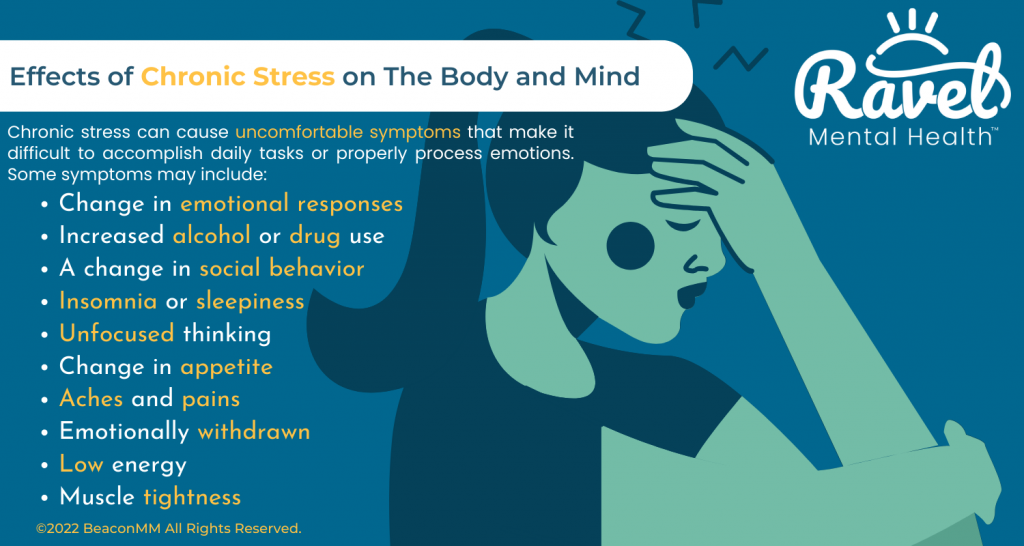Stress has become commonplace and leads to a wide variety of physical and mental health issues. People normally experience stress when they have something come up that was unexpected or they’re pressed to accomplish something under a strict amount of time. While everyone experiences this kind of stress at points in their life, chronic stress can be a difficult problem to deal with.
Chronic stress can greatly impact your overall well-being as this can impact your body functions and the state of your mental health. There are several reasons why people may experience regular stress and how their coping mechanisms can help them or create more stress. Here’s a guide on how being always stressed affects your body and brain.
Are you interested in finding a therapist to help you work through your stress? Sign up for Ravel Mental Health today to start your journey!
What Is Chronic Stress?
Chronic stress is a consistent sense of feeling pressured and overwhelmed over a long period. We’re wired to respond to stress and remove it; sometimes, this can be automatic. However, some people have complex experiences that don’t have easy solutions, which is when someone may experience chronic stress over an extended period.
There are several reasons why someone may be experiencing chronic stress. These reasons can include the following:
- Poverty
- Dysfunctional marriage or family
- Deeply dissatisfying or overwhelming job
- Drastic change of life status
These problems typically don’t have easy solutions. However, some instances that cause stress can usually be solved fairly quickly and allow the person to move on. These complex issues are typically prolonged situations that involve someone needing to think about solutions.
Chronic stress slowly drains a person’s psychological resources and damages their brains and bodies. People experiencing chronic stress often feel incapable of changing their situation, but typically, by employing the right de-stressing strategies and reframing their mindset, they can find some relief and begin to find solutions to cope or remove stressors in their life.
What Are the Effects of Stress on the Body?

Stress can cause a multitude of issues for someone’s body. Some people experience headaches or other symptoms that might only happen occasionally. However, people with chronic stress typically have several body symptoms that can affect the way their function in their life, including:
- Aches and pains
- Muscle tightness
- Insomnia or sleepiness
- Low energy
- Change in appetite
- Increased alcohol or drug use
Stress is a response in the body to something challenging or overwhelming. When in a potentially life-threatening situation, this bodily response is designed to help you increase your chances of survival.
However, your body isn’t designed to feel that level of stress over a long period of time. For example, while appetite changes are normal and not problematic while experiencing a stressful event, chronic stress can lead to unhealthy eating habits and damage to your digestive system.
Stress also makes it difficult for your body to get a good night’s rest, which is harmful to your health and causes daytime fatigue. You may also experience body aches that are uncomfortable or painful. These physical symptoms will hinder a person’s ability to accomplish tasks and can therefore add to feelings of stress.
Are you interested in finding ways to reduce your stress? Sign up for Ravel Mental Health to get professional guidance!
What Are the Effects of Stress on the Mind?
You may be wondering how being stressed all the time affects the brain. Well, it can drastically affect people’s behaviors and daily functionality. Since they are overwhelmed with everything
they need to accomplish, they may experience physical symptoms such as low energy that make it challenging to complete tasks. Then if they can’t complete what they want, their mental health will begin to decline.
Some symptoms that someone may experience from the effects of stress on their mind include:
- A change in social behavior, such as staying in often
- Unfocused or cloudy thinking
- Change in emotional responses to others
- Emotional withdrawal
These are common symptoms that people can experience as their brain is focused on stress, making it harder to cope with other emotions. Stress can also harm your brain’s decision making abilities, leading to impulsive or irritable behaviors. Additionally, people often turn to harmful coping methods to deal with their stress, which further affect their ability to complete tasks, their relationships, and their mental health.
There are also psychological and physical conditions that may develop as a result of chronic stress, including:
- Diseases such as hypertension, heart disease, obesity, metabolic syndrome, Type II diabetes, and arthritis
- Addiction to alcohol, nicotine, or prescription drugs, and behavioral-related such as addiction to the internet, food, or gambling
- Mood disorders and anxiety disorders are common secondary diagnoses for people with chronic stress
Since chronic stress can lead to health problems that could be severe, it’s essential to seek help. There are some ways that you can try to cope with your stress, but going to therapy can be a great way to get additional support to find something that works for you.
What Are Treatments for Constant Stress?
There are many home remedies that people may use for stress. However, some people who have chronic stress may find it difficult for these methods to work for them. If you’re struggling with chronic stress, some things that you may be able to do to help include:
- Exercising
- Eating healthy foods
- Learning time management techniques
- Setting realistic goals
- Getting more sleep
- Making time for leisure activities
- Building stress reduction skills
- Learning and practicing mindfulness (learning to control attention)
These techniques can often help reduce stress but may not be effective for long-term relief. So, if you’ve tried everything from yoga to journaling and still can’t get your stress under control, then it may be time to get professional help. A therapist can help dig into what’s causing your stress and work with you to find solutions that work for you.
You can work with your therapist to understand why you may be experiencing high and constant stress. Once the reason is identified, your therapist can give you tools to help cope with the stress and work towards ways to mitigate that feeling. This can include changing your lifestyle in small and easy steps or finding a way to solve the issue.
Choosing a Therapist for Chronic Stress
Trying to choose a therapist can be stressful and time-consuming. And when you’re already dealing with chronic stress, it may be difficult to add to that by trying to find a therapist that fits your needs.
Ravel Mental Health is an online platform that is revolutionized online bookings within the mental health industry. You can go onto our platform and use our built-in filters to help find the type of therapists you want. Then you can easily book appointments with them and avoid playing phone tag to book an appointment, and avoid the excess stress.
If you are struggling with chronic stress, you can utilize platforms like Ravel Mental Health to find therapists to help you find the root of your problem. From there, you can work through treatments that will help you reach a level of healthy coping habits that benefit your mind and body. Get help with chronic stress to return to your normal life without stress.
Are you ready to make a change in your life? Sign up for Ravel Mental Health to connect with a therapist in your area today!
